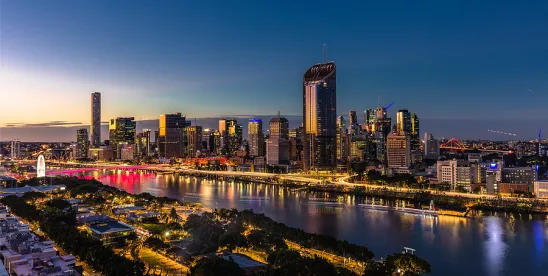Sick of Brisbane being dubbed the sleepy city? The proposal for 24/3 precinct operating hours will make this a thing of the past. Queensland Premier Steven Miles has announced AU$1.6 million in funding to support live music in Queensland, and John Collins (who was the bass guitarist for Brisbane's very own rock band, 'Powderfinger') has been appointed as Queensland's first Night-Life Economy Commissioner.
Luke Fraser, the Property Council of Australia Queensland President and CEO of Howard Smith Wharves, has said the time is right for Brisbane to cement its reputation as a global tourism, cultural and economic powerhouse.
“Brisbane is coming of age; we have international investors knocking on the door and in a little over eight years we will host the biggest sporting event in the world, bringing global exposure and with it enormous opportunity.”
A 24/3 precinct would mean 72 consecutive hours of trading operations for Brisbane's 'safe night precincts' in Brisbane CBD and Fortitude Valley.
Locals will have increased access to services and entertainment, as well as experience an uplift in employment opportunities to cater to the increased demand and trading hours. The city will be more dynamic and energetic for tourists, encouraging longer stays, greater spending and repeat visits. Naturally, Lord Mayor Adrian Schrinner has considered the implementation of 24-hour public transport services on weekends, similar to that proposed for Brisbane Metro. More late-night services would allow people to access party precincts more easily, and to get home sooner and safer.
Having 24-hour trading is anticipated to drive significant economic growth, with hospitality and tourism sectors in particular expected to see substantial gains. This change, which will boost Brisbane's nighttime economy, has been encouraged and supported by local industry leaders within music and entertainment venues, who say current overly stringent regulations have caused the industry to suffer.
To implement 24/3 trading zoning laws, liquor licensing laws, and noise control restrictions will necessarily be amended. Legislators must strike a balance to foster economic growth, whilst being mindful of community well-being and safety.
While these proposed changes will support economic growth in the lead up to, and during, the Brisbane 2032 Olympic and Paralympic games, Brisbane will revel in the lasting benefits. Long-term economic development will be driven by an increase in visitors and investors attracted by a lively nighttime economy.
Let us look back to 1988, when Brisbane hosted World Expo 88 (Expo), an event involving 15 million visitors over a period of six months. In addition to creating a physical mark on the cityscape, Expo also created legacies through the change in lifestyle and cultural habits of Brisbane locals. This event put Brisbane on the map as a sociable city, made possible by a change of government allowing for restrictions on public gatherings and trading and licensing laws to be relaxed.
Behaviours that locals enjoyed during Expo gave birth to modern-day Brisbane, and the alfresco dining and café culture. Once residents had a taste of this way of life, they were not prepared to go back to their pre-Expo lifestyle. Expo shows how an event like the Olympics can change how Brisbane residents will live, and their willingness to embrace that change long into the future.
Although Expo pushed Brisbane's night life along, a 24/3 precinct in the lead up to, and following, an event as mammoth as the Olympic Games would allow Brisbane to truly flourish on the world stage when it comes to night life and culture.
The authors would like to thank paralegal Kaia Pascoe for her contributions to this legal insight.





 />i
/>i
